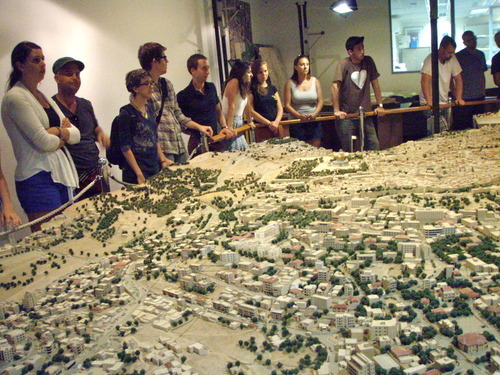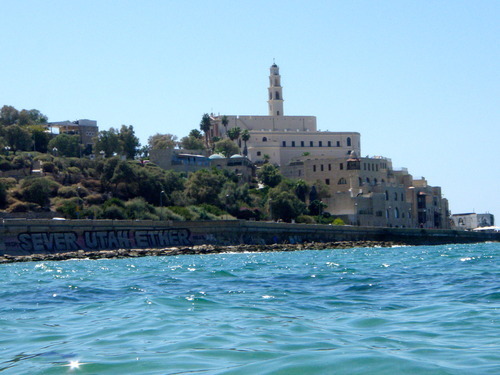The following article was written by Galit Roichman, who teaches the Tikkun Olam participants a weekly class on Israeli society through Israeli film. The article appeared last week in Hebrew on Ynet (link), and appears below in translation. Here is a link to Galit's website on Israeli film.
Israel's "Pillar of Defense," Through The Eyes of Others
Whoever has not had the
chance to see the Israeli reality from the viewpoint of foreigners has missed a
golden opportunity to get a humorous and tragic perspective on the most basic
raw materials of our lives," says a lecturer on cinema for volunteers from
abroad.
by Galit Roichman, November 19, 2012
On Thursdays between 2:00-5:00
PM I can be found in world repair. It's
less strange than it sounds. Tikkun Olam (repairing the world), in addition to being a key idea in Jewish
discourse, is the name of a service-learning program that offers Jewish young
adults from around the world an in-depth experience of Israeli society.
During the course of 5 or 10
months, these young adults live in south Tel Aviv and in Jaffa, and engage in
volunteering and study that offers them a better understanding of the reality
of life in this corner of the Middle East.
If once the conventional wisdom was that we need to show Jewish tourists from abroad the beauty
and magic of the promised land, to whet their appetites for its joys and
pleasures, today a different approach has taken hold – let's invite our Jewish
brothers and sisters from across the sea to see Israel as it really is. Come journey with us not only on the scenic
journey through Masada, the mountainous Jordan and the Kotel, but let's also give them a chance to see the back yard, such as the one found in the area of
the Tel Aviv Central Bus Station and the impoverished neighborhoods of Jaffa.
These folks do not come here
to be impressed; they come here to take part in the project, to influence, to
give and above all – to belong. These
stormy days that are passing over all of us are not passing over the
participants of Tikkun Olam, world repairers.
Last Thursday I arrived to Tikkun
Olam to meet the participants of the new semester, and to start my series
of lectures on Israeli society through the lens of cinema. A bit before I started, the group's
coordinator asked me for a couple of minutes so that she could brief the group
on the security situation in the south of Israel and to the Pillar of Defense
that arose in its footsteps.
What can I say, whoever has
not had the chance to see the Israeli reality from the viewpoint of outsiders
has missed a golden opportunity to get a humorous and tragic perspective on the
basic raw materials of our lives.
The coordinator described the
situation precisely – rockets falling on the south of Israel and the IDF attacking
in Gaza, and explains the home front guidelines – to remain alert when in
public spaces, and to know where the protected areas are that they will need
to go to in the event of a siren.
The program participants (all
in their 20s), respond with a volley of questions: what is the chance that the
war will reach Tel Aviv? In the event
that missiles fall in the Tel Aviv area, will the program evacuate them from the
danger zone and order them plane tickets home? How can they inform the U.S.
embassy of their whereabouts in Jaffa and south Tel Aviv so that, in an
emergency, the embassy can locate them and ensure their wellbeing?
And the question of all
questions – "When you tell us to stay generally alert, what does that
actually mean? We understand that we need to be aware of suspicious items, but are there other warning signs that we, who aren't from Israel, need to know how to identify?"
The last question sparked
within me a geyser of dark humor – "Yes. If someone gets on the bus and
yells 'Allah hu-akbar!' you should jump out the window."
Twenty eyes turned to me with an embarrassed and confused look.
First, because you need to be Israeli to understand the joke, and
second, because it's not totally clear to these foreign visitors why it is so pressing
for a teacher of cinema to tell a joke at this exact time and place when
there's a war on the horizon.
Dark Humor as Protective
Armor
And so, it is pressing to the
teacher and to the Israelis to use humor as one uses protective armor. In order to form a basis for my argument, I
rush to open the class with a scene from Walk on Water, Eitan Fuchs's
film from 2004.
Eyal is a tough Mossad agent
that has been assigned to go undercover as a tour guide, and to accompany Axel,
a young German man who happens to be the grandson of a Nazi war criminal. Eyal waits for Axel at the airport, and their
first interaction goes like this:
Eyal: Welcome to Israel. There was just a terrorist attack here.
Axel: Right here?
Eyal: In Rishon LeTzion, it's
a nearby city. But don't worry, usually
they just blow up once a day. Usually,
but maybe for you they'll do another attack.
Axel is silent. He gives Eyal an embarrassed look.
Eyal: I'm joking.
Axel: Ahh.
I really love this
scene. In my mind, it demonstrates
beautifully the relationship between the filmed cinematic text and the audience
watching it. An Israeli audience listens
to the dialogue and laughs, a foreign audience hears the audience and is
perturbed. The Israelis, products of the
culture that spawned the film, understand its subtext, while the foreigners
experience only the text itself.
This is of course true of any
film and the way in which it is received by the domestic audience and the
foreign audience, but what is interesting in Walk on Water and makes it
such a big success among foreign audiences, is that the film from the outset
directs itself to foreign eyes and offers them a character with whom to
identify.
Throughout most of its
history, Israeli cinema was focused on itself and on the
"homecoming," with which it sought to discourse. During the last several years, a new trend
developed, of which Walk on Water is one of the most typical
representatives – cinema that seeks to view the essence of being Israeli not
necessarily from our native viewpoint, but rather from the perspective of the
foreigners who come to us from outside.
And so it is that the German
(and Christian and gay) Axel is the one who teaches Eyal, the handsome but
emotionally handicapped sabra, to walk on water, or rather shows him the
lost path to the sweet fruit of the
sabra cactus, the one that was forgotten under the camouflage of sharp thorns.
German Axel is not
alone. Alongside him is Noodle, the cute
Chinese child from the film named for him (Noodle, directed by Eilat
Menhami, 2006), that brings relief to the weary soul of Miri, an IDF widow who
lost two husbands to Israeli wars.
Miri, like Eyal the Mossad agent, surrendered under the weight of
Israeli life, afflicted with grief and sorrow.
Indeed the foreigner and the other,
the same little Chinese boy that does not understand our painful subtext, is
the one who manages to understand her
soul and to return to her a zest for life and hope for the future.
On a much lighter note, we
can add to the group of "foreigners among us," films, The Band's
Visit, in which members of the Egyptian band shed light on the sleepy lives
of the residents of the fictional development town Beit HaTikvah. And there are also more critical films – Eyal
Halfon's What A Wonderful Place, and Ra'anan Alexandrovich's James'
Journey to Jerusalem and Eran Riklis's The Human Resources Manager. In short, a foreign perspective has refreshed
the view of our homeland several times in the crop of Israeli films in recent
years.
I intended to tell one thing,
and then I digressed to farther off subjects of a different sort. What I wanted to say was that on that same
afternoon with Tikkun Olam, last Thursday, I was given the privilege to observe
the reality of our lives from outside, through the embarrassed and curious perspective
of twenty-something people who aren't from here and aren't committed to staying
here even one dangerous minute.
An hour after we parted ways,
a siren already went off in the Tel Aviv area.
I don't know how they felt at that moment and I'm sure it was very
unpleasant.
They don't have the armor of
dark humor that many of us sabras have, and I also suspect that the Jewish-Israeli
term "Iron Dome" (the short-range missile defense system) sounds to them rather strange and not so comforting.
In any event, I have a strong
feeling that next Thursday they will still be here, ready to repair the world
in this stormy corner of the Middle East.
Good for them that they possess the bravery to continue volunteering, to
continue to learn about us under fire.
To be a mirror for us.

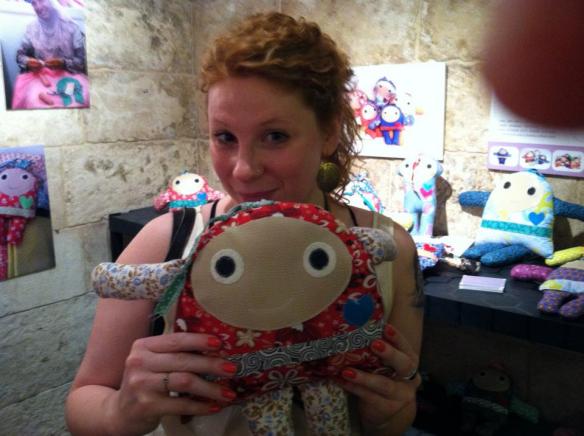
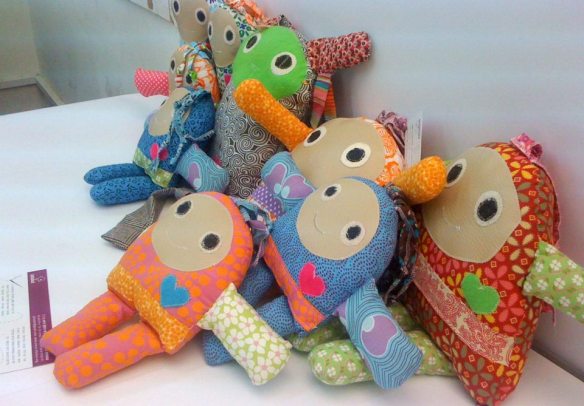
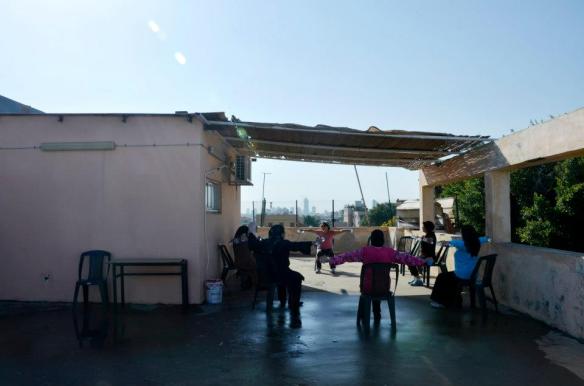
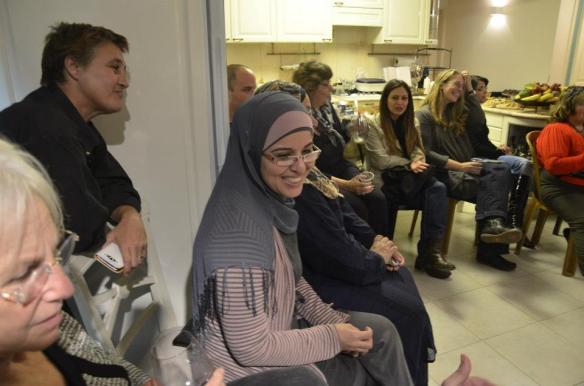






.jpg)

